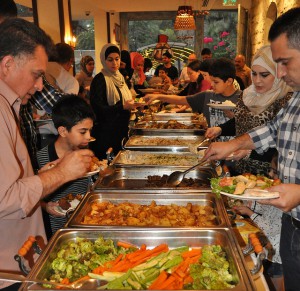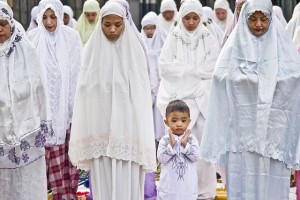The Fasting Month of Ramadhan in Indonesia Posted by asimonoff on Jun 22, 2015 in Uncategorized
Ramadhan, the ninth month of the Islamic Calendar (Hijri Calendar), is the fasting month (Bulan Puasa), and it is of great importance in Indonesia, which is a predominantly Muslim country. The days Ramadhan is celebrated vary every year, as the calendar is based on cycles of the lunar phases. Even though each month on the Islamic calendar could be either 29 or 30 days long, the new month can only begin on the day when the first sliver of the new moon is first observed, which is usually on the 14th or the 15th. In Indonesia, Ramadhan begins when the government has officially announced the date of the fasting month based on the deliberation made by the moon-sighting committee.
Fasting during the month of Ramadhan is obligatory for every mature (over the age of puberty), sane, healthy Muslim, and it is one of five pillars of Islam (Rukun Islam); those who are physically able will start the fast before sunrise and break the fast (Buka Puasa) after sundown, around 06:00 pm. Fasting is done for fourteen to sixteen hours a day for twenty-nine or thirty days.
Those who fast avoid doing forbidden activities that can nullify the fast (batal puasa), and they control their emotions, physical body, and desires—they do not eat, drink, smoke, and do physical relations; these can be resumed after breaking the fast. However, despite being physically challenged, especially in a tropical country like Indonesia, while they are fasting, they believe that they should not retreat from their daily routine; rather, they are encouraged to continue their work and usual activities. In fact, this is where the challenge of patience and endurance comes in, as it is believed that fasting is not merely a physical ritual but is primarily a time for reflection and spiritual recharging.
Muslims believe that the fasting month of Ramadhan is a month full of God’s blessing—all of one’s good deeds and prayers will be rewarded, and all sins will be forgiven and start anew the following year. They increase their religious-related activities and practices: praying more than just the five-time obligatory prayers, reciting the Quran, engaging in charity—giving zakat and sadaqa (giving money to the needy)—and repairing relationship with family, friends, and others.
Before breaking the fast at Maghrib or after sunset, there is a tradition called “ngabuburit,” derived from Sundanese language (West Java), which means “spending time doing activities while waiting for breaking the Ramadan fast.” They usually go to the mall for window shopping and purchasing snacks, which are mostly sweet, to break the fast (jajanan buka puasa). Another tradition is called “buka bersama”, which means breaking the fast together either with relatives, friends, or colleagues at offices, restaurants, or cafes. Sometimes, it is followed by shalat tarawih, an emphasized non-obligatory (Sunnah) evening prayer during the month of Ramadan that is mostly held in the mosques after breaking the fast.
After the end of the fasting month of Ramadhan, Muslims in Indonesia and around the world will celebrate Eid al-Fitr (Lebaran), which falls on the first day of the new Islamic month of Shawwal; on this day, Muslims are forbidden to fast. The Eid al-Fitr is considered a triumph day (hari kemenangan) after fasting successfully for thirty days. Muslims in Indonesia celebrate the Lebaran by visiting elders, relatives, friends, or their superiors by asking for forgiveness and forgiving others.
Selamat menunaikan Ibadan puasa – Hope you have a blessed Ramadan.
| Indonesian | English |
| Bulan puasa | Fasting month |
| Rukun Islam | The Five Pillars of Islam |
| Berpuasa | fasting |
| Berbuka puasa | breaking a fast |
| Buka puasa bersama | Breaking the fast together |
| Batal puasa | Nullify the fast |
| Jajanan buka puasa | Snacks for breaking the fast |
| Ngabuburit | Derived from Sundanese language (West Java), which means spending time doing activities while waiting for breaking the Ramadan fast. |
| Sembahyang | Praying |
| Shalat Tarawih | During the month of Ramadan, Muslims conduct special prayers each night, called taraweeh prayers, |
| Kalender Islam/Kalender Hijriah | Islamic Calendar/Hijri Calendar |
| Kalender Masehi | Gregorian Calendar |
Images were taken from Flickr.com/creativecommons
1. by Patrick Crowley
2. by Peter Dahlgren
3. by Young Shanahan
4. by Tanti Ruwani

Build vocabulary, practice pronunciation, and more with Transparent Language Online. Available anytime, anywhere, on any device.
About the Author: asimonoff
I’m an Indonesian language instructor, instructional material developer, reading test developer, and interpreter. I have been teaching Indonesian to adult students for 15 years, and have been teaching students from many backgrounds, such as private, military and diplomatic service employees. I’m Indonesian, but am living in the US now; my exposure to different cultures in my home country and in the US has enriched my knowledge in teaching Indonesian as a second language. I approach the teaching of the Indonesian language by developing students’ critical cultural awareness and competence. This method of teaching has been proven to be a key to the success of my students. Students become conscious of the essential role culture plays in the language.








Comments:
Rajesh:
How to say Ramadan Kareem in Indonesia
asimonoff:
@Rajesh Ramadhan Karim.